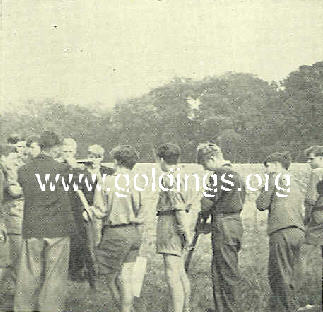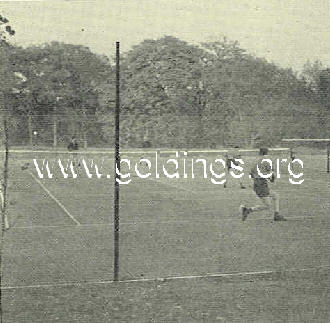|
GOLDINGS HARD TENNIS COURTS
Since the summer of 1947 boys from Goldings have attended Wimbledon annually and have become famous in the tennis
world as "top flight" ball boys. This close association with the game and being able to watch the world's best players in action,
has been responsible for creating a personal interest, and many creditable performers have been produced on the Goldings'
grass courts. Generally only one grass court was available, and the demand for bookings being so great, individual play and
interest was-naturally limited.
It was this lack of facilities that prompted the Headmaster to start the ball rolling, and interest the sub-committee in
granting money for the constructing of two hard courts—or as they are known in the trade—all weather courts. A conference
between the Headmaster and myself followed to consider the all important issue, total cost. Two estimates were prepared
(i) an all-in figure of some £2,500 assuming that work would be completely contracted out to a specialist firm and (ii) an
estimate assuming that most of the work and construction would be carried out by the gardening department. The second
project was agreed upon and the committee granted £900. Mr. Wheatley then wrote to the All England Tennis Club, and they
very kindly made a donation of £100 towards the outlay.
The choosing of a suitable site, and the planning of all the actual detail was then considered—the original plans having being
studied and approved by the committee—the real operations commenced in October, 1958. Before this date, however, work
had begun on the casting of the concrete edging tiles, starting in June, sixteen were made each week, until a total of 220 was
reached. Levels were taken with a dumpy level, and the key pegs fixed.
From these readings it was ascertained that 600 tons of earth would need to be removed. While this was in progress, .ashes
were being obtained weekly from the local gas works, 20 tons being required to lay 6 inches of base. These in turn had to be
hand riddled, so that the rough could be laid first, followed by the finer. The whole being rolled in three layers, (a) the soil bed,
(b) the rough ash and (c) the fine surface. At the same time the edging tiles were concreted into position, and the work of
erecting the surrounding netting put in hand.
On 20th April, 1959, an outside firm who had been invited to carry out the final laying of the playing asphalt started their
operations, and with the assistance of two boys, completed this work in two weeks. The gardening department again took over,
completing the project by tying in all the netting, etc. and green spraying the whole area.
It was with great relief and no doubt personal satisfaction to myself and the rest of the department, when the courts were
officially opened and declared ready for use on 20th May, 1956.
In conclusion, I would like to thank the boys of the gardening department for all the extremely hard work which they put in
to this work, often under very unpleasant and uncomfortable conditions, and to many of the masters who gave both technical
and active assistance.
L.E.
|



